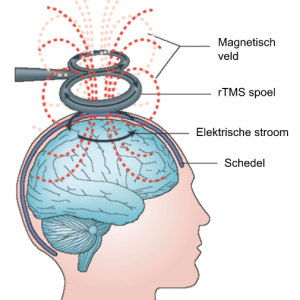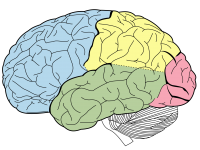
Effects of rTMS treatment for depression/OCD
rTMS stands for repetitive transcranial magnetic stimulation and is effective for depression and obsessive-compulsive disorder (OCD). During rTMS treatment, short magnetic pulses are administered to the head. When these short pulses are repeated in a certain pattern over a longer period of time, brain activity can be modulated. This improves communication between different brain areas.
Much research has now been done on the effect of rTMS treatment for depression and obsessive-compulsive disorder and it is now an evidence-based and safe treatment. During a treatment session, stimulation is applied to the front (depression) or top (OCS) of the head, as research has shown that this is where the optimal effects are achieved.
(Image obtained and adapted from Ridding & Rothwell, 2007)
Side effects rTMS
The advantage of rTMS treatment for depression over medication is that it causes almost no, or very mild, side effects. One possible side effect is a mild, transient headache that people may experience after treatment, which can be remedied with paracetamol. This is because small muscles on the head contract during the treatment. This is nothing to worry about.

Do you have any questions?
Neurowave is happy to answer them
Course of rTMS treatment for depression
1) Firstly, you will have an intake appointment with a (mental healthcare) psychologist and/or psychiatrist to determine whether rTMS may indeed be a suitable treatment for you. An intake appointment is generally possible within 1 to 2 weeks. Each intake is discussed in our multidisciplinary team. If there are no reasons to forgo rTMS, treatment can start approximately two weeks after the intake.
An rTMS treatment session for depression or OCD takes about 45 minutes. During a treatment session, the magnetic coil is placed on the front or on top of the head. On average, rTMS sessions take place twice a week. A full treatment entails 20-25 sessions.
3) The rTMS treatment for depression and obsessive-compulsive disorder has been found to be more effective when some form of psychotherapy is also involved. Therefore, we offer that during each session. During this psychological treatment, we pay attention to factors we know play a role in depression and OCD, such as sleep problems and inactivity.
Exclusion criteria
When is rTMS not or less suitable for you?
- if you have/if your direct family has epilepsy
- if you have had a brain stroke
- if you have undergone neurosurgery
- If you have metal implants in the head (not in the mouth), which are magnetisable
- If you suffer from severe substance abuse
You are less likely to benefit from rTMS if you have:
- psychotic depression
- severe personality disorder
- when you have been unsuccessfully treated with Electroconvulsive Therapy (Electroshock Therapy)
Cognitive behavioural therapy
At Neurowave, the rTMS treatment is combined with cognitive behavioural therapy (also known as CBT). Research shows that this increases the effectiveness of rTMS. Cognitive behavioural therapy looks at patterns in your thoughts and in your behaviour. At its core is the assumption that so-called irrational cognitions (thoughts) cause dysfunctional behaviour, such as avoidance behaviour. The techniques used in cognitive
behavioural therapy focus on changing these irrational cognitions. For example, a person with depression may have the irrational thought that no one likes him or her, causing him to avoid friends (avoidance behaviour). Attention is paid to factors known to play a role in depressive symptoms, such as inactivity and disturbed sleep patterns. We do this because many people who struggle with depression also have a sleep disorder. When the sleep problems are not treated as well, it has a negative impact on the treatment outcome of rTMS. In other words, when sleep symptoms are not addressed, treatment of depression is usually less effective. When a sleep disorder is present, it is treated using an online treatment programme (E-health). Following an online treatment programme for sleep disorders is a scientifically researched, effective way of treatment that many patients find pleasant, as you can follow it at home on your computer at a time that suits you.
